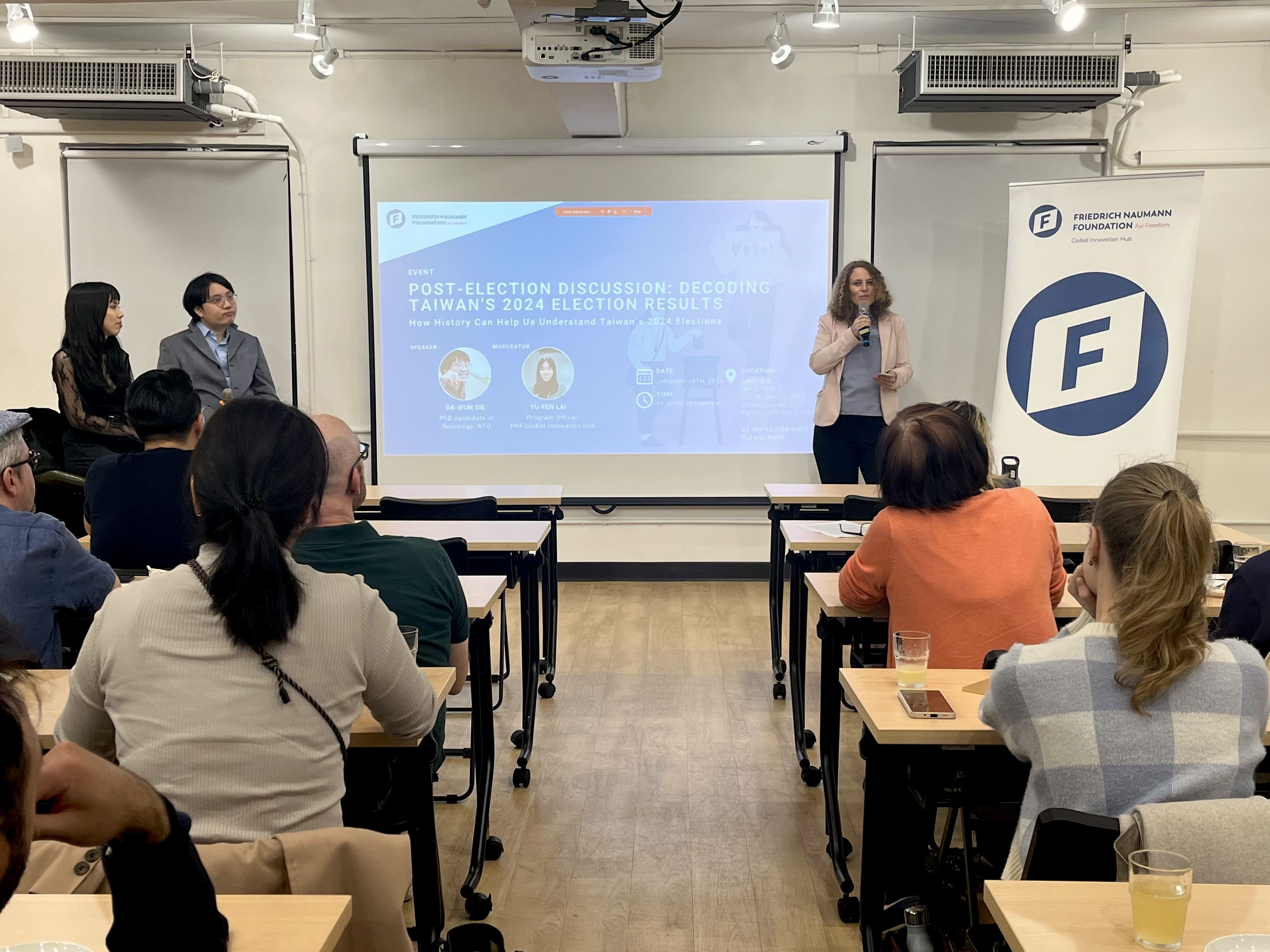Event
FNF Global Innovation Hub on Taiwan Elections: 'Wide Political Divide in Youth; Rebuilding Political Culture Key to Shaping Future Politics'

Friedrich Naumann Foundation for Freedom (FNF) Global Innovation Hub organized the event 'Decoding Taiwan's 2024 Election Results.
© FNF Global Innovation HubOn January 19th, 2024, the Friedrich Naumann Foundation for Freedom (FNF) Global Innovation Hub hosted an event titled 'Decoding Taiwan's 2024 Election Results.' The Hub emphasized that the reconstruction of political culture would be crucial for Taiwan's future political landscape, given the diverse political views among the younger generation.
The event speaker, Da-Wun Sie, a PhD candidate in Sociology at National Taiwan University and a freelance journalist, highlighted the varied perspectives among young voters in Taiwan. Some are strongly aligned with the values and principles of the Democratic Progressive Party (DPP), while others have never fully identified with the DPP. The latter group, who had 'lent' their support to the DPP during crucial times such as the 2016 election (following a singer's apology for waving the Taiwan flag and the 2014 Sunflower Movement) and the 2020 election (in the wake of the massive 2019 protests in Hong Kong), withdrew their support during the 2022 Taiwanese local elections.
According to Da-Wun Sie, these voters often acknowledge the threat from China yet show a certain level of political apathy and skepticism regarding domestic politics, perceiving it as rife with 'ideological' disputes. Deemed 'unreachable' by the Kuomintang (KMT) and never fully convinced by the DPP, many of them supported the Taiwan People’s Party (TPP) in the 2024 Taiwan elections. Mr. Sie also highlighted other features of this year’s elections, including how the opposition parties criticized the ruling DPP based on historical roots, and the important fact that none of the political parties in Taiwan has challenged the current ‘Republic of China in Taiwan’ stance of cross-strait relations during the campaign.
Sie stressed the importance of engaging the youth in policy debates directly affecting the country's future, discussing important issues such as sovereignty, human rights, and gender equality. The speaker also emphasized the need for society to reject ambiguous political rhetoric and hold those who spread misinformation accountable. These factors, according to Da-Wun Sie, were critical in shaping a democratic society's political landscape.
Last December, Da-Wun Sie and Yu-Fen Lai, the Program Officer of the FNF Global Innovation Hub, co-authored a report examining cross-strait relations and positioning the 2024 elections within a historical context. They argued that the vast majority of Taiwanese people have not supported 'annexation' or what Beijing refers to as 're-unification' since the beginning of democratization in Taiwan. Additionally, the DPP has distinctly shifted towards a 'Republic of China in Taiwan' policy. Thus, interpreting election outcomes in Taiwan should not be oversimplified into a binary of being pro-/anti-China, or even pro-/anti-unification.
About FNF Global Innovation Hub: The Friedrich Naumann Foundation for Freedom is dedicated to promoting democracy, human rights, economic freedom, and combating climate change. Its Global Innovation Hub, with a focus on digital transformation and innovation for democracy, is designed to be a hub of creativity and liberalism. In 2021, following the passage of Hong Kong National Security Law, the Foundation relocated the Hub from Hong Kong to Taipei.
Reference:
- The Issue Is Not Unification, but Forced Unification. How History Can Help Us Understand Taiwan’s 2024 Elections
- The China Factor in Taiwan's Elections? German Think Tank: Taiwanese Voters Concerned About Being 'Forcibly' Unified with China
- Only 'Lent Their Votes' Four Years Ago: A Profile of Voters 'Beyond Blue and Green' in Two Taiwanese Elections
- A Household with Two Generations Voting for Three Parties: Economy, Unification, War? How the 1992 Consensus Was Discussed Before the Election
